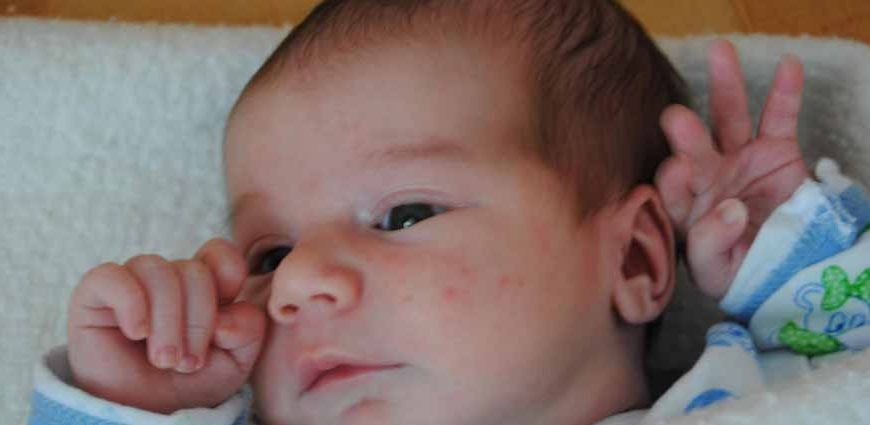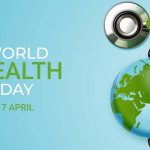Is there acne on my baby’s face?
Yes, it’s possible. Although acne commonly first appears in teens, it can also affect newborns. Here is the guide on what parents should know.
While it’s true that baby acne typically resolves on its own, understanding its origins and knowing how to manage it effectively can make a significant difference in your little one’s skin health and overall well-being.
What is Infantile Acne?
Infantile acne is a common skin condition that affects newborn babies. It typically appears within the first few weeks of birth and is characterised by small red spots or pustules on the baby’s face, particularly on the cheeks, nose, and forehead.
Signs and Symptoms
Instead of blackheads, newborn acne will resemble white pimples or red patches. These patches typically appear on the nose and cheeks of a newborn, although they can also appear on the:
- Forehead
- Chin
- Neck
- Scalp
- Upper back
- Upper chest
Cysts may also result from them, and scarring may follow. It usually affects the forehead, chin, and cheeks. Though less frequently, it can also occur on the body.
Causes of Infantile Acne:
- Maternal Hormones: Hormonal fluctuations during pregnancy can lead to an overproduction of oil in the baby’s skin, resulting in the development of acne.
- Blocked Pores: A baby’s delicate skin can easily become clogged with dead skin cells, leading to the formation of acne.
- Genetics: Some babies may be more predisposed to developing infantile acne due to genetic factors.
- Irritants: Exposure to certain irritants, such as harsh detergents or skincare products, may exacerbate or contribute to infantile acne.
How Long Will My Baby’s Acne Last?
Infantile acne typically lasts for a few weeks to several months, with most cases resolving by the time the baby reaches 6 months to 1 year of age. While the exact duration can vary from one baby to another, infantile acne is generally a temporary and self-limiting condition that does not require treatment.
Acne in children can sometimes be more serious than usual. It can sometimes linger for two years, or even longer. This may necessitate treatment, particularly if it appears tenacious; it can potentially cause scarring if not treated appropriately.
Home Remedies & Treatment Options:
While infantile acne typically resolves on its own without intervention, some cases may require treatment to alleviate discomfort and prevent scarring. Here are some effective treatment options:
- Gentle Cleansing: Washing the affected area with a mild, fragrance-free baby cleanser and lukewarm water can help remove excess oil and debris without irritating the skin.
- Avoid Harsh Products: Avoid using harsh skincare products or detergents that may further irritate the baby’s skin. Opt for hypoallergenic and fragrance-free alternatives.
- Moisturise: Applying a gentle, non-comedogenic moisturiser can help maintain the skin’s moisture balance and prevent dryness, which may exacerbate acne.
- Breast Milk: Breast milk has a lot of benefits. It carries lauric acid, which has antibacterial and anti-inflammatory properties. Apply a few drops of breast milk to the pimples, then let it air dry.
- Coconut Oil: Skin prone to acne can be healed by using coconut oil. It has a variety of nutrients, including lauric acid, vitamin K, and E, among many others. It is easily absorbed by the skin, quickly restoring lost moisture and giving the skin’s surface a soft touch.
- Antibiotics: In rare cases where infantile acne is accompanied by inflammation or infection, oral antibiotics may be prescribed to help control bacterial growth and reduce inflammation.
- Time and Patience: Most importantly, it’s essential to remember that infantile acne typically resolves on its own with time. Patience and gentle skincare practices are often the most effective strategies for managing this condition.
Is it An Indicator of Future Skin Problems?
Experiencing baby acne is not necessarily an indicator of future skin problems. Baby acne, while distressing for parents, is a common and usually benign condition that typically resolves on its own without intervention.
However, if you have concerns about your baby’s skin health or notice persistent or severe skin problems as they grow, it’s always a good idea to consult with a paediatrician or dermatologist.
With proper care and attention, most skin issues can be effectively managed to ensure your baby’s comfort and well-being.
Identifying Baby Acne and Similar Conditions
There are various skin diseases that people might confuse as baby acne. These consist of:
- Erythema Toxicum: Also known as newborn rash, erythema toxicum is a common rash that affects many newborns. It resembles red, blotchy patches with small yellow or white bumps in the centre. Erythema toxicum usually appears within the first few days of life and resolves within a week without treatment.
- Allergic Reaction: Babies can develop allergic reactions to certain foods, medications, or skincare products, leading to redness, swelling, and bumps on the skin. It is essential to identify and avoid the allergen to prevent further reactions.
- Chickenpox: The varicella-zoster virus is the infectious agent that causes chickenpox. Along with irritation, fatigue, and fever, it results in a rash of pimples and blister-like patches. Although the rash from chickenpox usually begins on the face, back, and stomach, it can spread to other parts of the body.
- Eczema: Eczema is a skin condition that results in dry, cracking skin. Rashes typically develop on the face and abdomen, but they can also extend to other body parts. The difference in texture between an acne and eczema eruption can usually be visible. Eczema causes dryness and possible peeling of the skin, while acne causes glossy and oily skin.
When to Consult a Doctor?
You shouldn’t be concerned if your kid develops acne before they turn six weeks old. You can try some of the suggested remedies, and the condition will eventually get better. But if you’re unsure, always get advice from your paediatrician.
If your infant has acne after six weeks of age, it’s alarming. Talk to a doctor if you are worried about your baby’s skin or suspect they may have eczema or chickenpox. You can trust a dermatologist’s experience to treat your child’s acne safely.
Frequently Asked Questions (FAQs)
- Baby acne typically appears as small red or white bumps on a baby’s face, particularly on the cheeks, forehead, and chin. These bumps may resemble acne in older children and adults but are usually not accompanied by blackheads or cysts.
- Since baby acne is often influenced by hormonal factors and other unknown triggers, it’s challenging to prevent it entirely. However, practising gentle skincare, avoiding harsh products, and keeping your baby’s face clean with mild baby cleansers can help minimise irritation and potentially reduce the severity of acne.
- The duration of baby acne can vary from a few weeks to several months, but it typically resolves on its own without treatment by the time the baby reaches 6 months to 1 year of age.
- Baby acne is generally not painful or itchy for infants. It’s primarily a cosmetic concern for parents and caregivers. However, babies with severe acne lesions may experience some discomfort or irritation.
- In most cases, baby acne does not leave permanent scars. However, picking or squeezing acne lesions can increase the risk of scarring. It’s important to refrain from manipulating your baby’s acne and allow it to resolve on its own to minimise the risk of scarring.
- In most cases, baby acne does not require treatment and resolves on its own over time. However, if the acne is severe, persistent, or accompanied by other concerning symptoms, such as fever or fussiness, consulting a paediatrician or dermatologist is advisable for further evaluation and guidance.
Q1.What does baby acne look like?
Q2. Can I prevent baby acne?
Q3. How long will my baby’s acne last?
Q4. Is baby acne painful or itchy for my baby?
Q5. Will baby acne leave scars?
Q6. Does baby acne require treatment?
For more such educational content on parenting, kids & children development, visit Eurokids blogs!!















